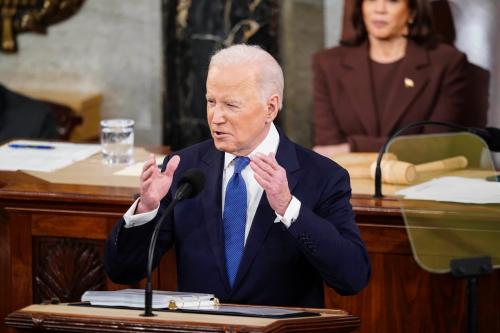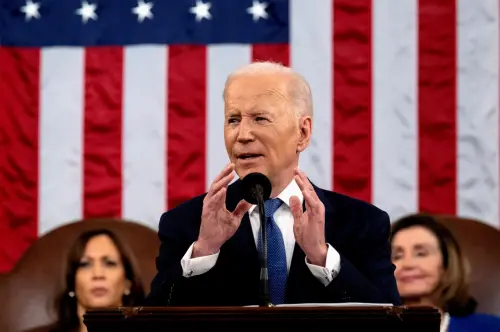This is part of the Biden State of The Union 2023 blog series in which Brookings experts preview national issues and policy proposals that President Biden should discuss in his second annual State of the Union Address.
If I were writing Biden’s upcoming State of the Union here’s what I would want to hear:
My fellow Americans, the time has come to act to protect the privacy of Americans, to promote good old-fashioned American competition, and to encourage the dissemination of facts and truth over lies and hate.
It is time to stop being whipsawed by new technology with powers beyond the reach of our traditional governmental authorities. Just as it was necessary a century ago to establish new statutes and structures to oversee the new activities of the industrial revolution, so today has the time come to establish new oversight of the effects of the digital revolution.
Americans’ privacy is being exploited. What was once personal information is collected, often without the individual’s awareness, to become a corporate asset to be rented to the highest bidder. That American citizens must waive their rights through the forced acceptance of dense and obtuse legal terms and conditions before they can participate in the digital marketplace must be put right. The countries of Europe—even China—have adopted rules about personal privacy online; the United States should not be a laggard.
Control of this personal information then allows the companies to dominate the marketplace and quash competition. As FTC Chair Lina Khan has observed, “control over data has enabled dominant firms to capture markets and erect entry barriers.” Those barriers keep new and innovative companies with new and competitive ideas out of the marketplace. There is nothing more American than competition, yet we see little of it in the dominant digital companies. Our antitrust laws were designed for another era; not only must they be updated, but they also must be accompanied by ongoing regulatory enforcement of competitive principles.
The flood of misinformation is a cancer eating away at our democracy. As I said in my inaugural address, “There is truth and there are lies. Lies told for power and profit.” At the same time, we must respect and protect the First Amendment to the United States Constitution. Government has no role in picking what can be said. Yet, the government can create incentives for online speakers to act responsibly. A century ago, the scourge was Yellow Journalism; today it is yellow digitalism. We dealt with the previous problem within the First Amendment, we must show similar resolve to appropriately deal with its successor as well.
To accomplish all of this we must have ongoing oversight that can establish behavioral rules for digital activity. We have a Pure Food and Drug Act to protect the safety of what we physically consume; the time has come for a similar agency to protect the safety of what we digitally consume. Last year Senators Bennet and Welch introduced legislation to create a new Digital Platform Commission.
A great Republican president, Theodore Roosevelt, explained, in his 1907 Message to Congress, “centralization in business has already come and cannot [sic] be avoided or undone.” As a result, “the public at large can only protect itself from certain evil effects… by providing better methods for the exercise of control through the authority already centralized in the National Government by the Constitution itself.” He told Congress, “What is needed is not sweeping prohibition of every arrangement, good or bad, which may tend to restrict competition, but such adequate supervision and regulation as will prevent any restriction of competition from being to the detriment of the public.” This meant, he explained, “there should be additional legislation looking to the proper control of the great business concerns engaged in interstate business, this control to be exercised for their own benefit and prosperity no less than for the protection of investors and of the general public.”
I urge the Congress of the United States to recognize that just as the industrial era needed new oversight to protect consumers and competition, so does the digital era.
The Brookings Institution is committed to quality, independence, and impact.
We are supported by a diverse array of funders. In line with our values and policies, each Brookings publication represents the sole views of its author(s).








Commentary
Biden State of the Union 2023: A need for digital regulation
February 3, 2023